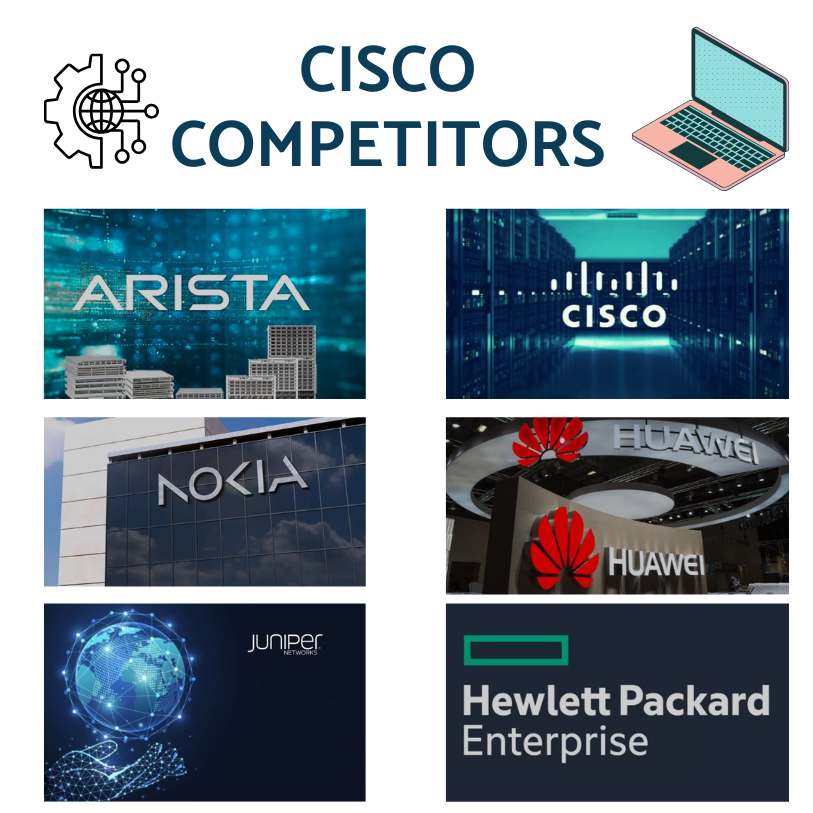Introduction
In the rapidly evolving networking industry, Cisco Systems Inc. (NASDAQ: CSCO) has been synonymous with reliability and innovation for decades. However, the competitive landscape is shifting dramatically, with emerging technologies and agile competitors challenging Cisco’s market dominance. To make informed decisions, businesses and investors must understand the strengths, weaknesses, and strategic positions of Cisco competitors.
Cisco and The Shifting Network Infrastructure Landscape
As digital transformation accelerates, enterprises demand more agile, secure, and high-performance networks. Technologies such as cloud computing, software-defined networking (SDN), artificial intelligence (AI), 5G, and edge computing are reshaping the industry. Cisco, traditionally a hardware-centric company, now faces intense competition from companies specializing in cloud-native solutions, AI-driven networks, and cost-effective alternatives.
Key Cisco Competitors in 2025: An In-depth Analysis
Let’s explore the primary Cisco competitors, highlighting their market positions, unique strengths, and strategic weaknesses.

1. Juniper Networks: The AI-Driven Challenger
Juniper Networks has emerged as a formidable competitor, especially in the service provider and cloud networking segments.
Company Overview
- Founded: 1996
- CEO: Rami Rahim
- Headquarters: Sunnyvale, California, USA
- Employees: ~10,000
- Market Share: ~12%
Strengths:
- Pioneering AI-driven networking with Mist AI technology
- Strong presence in cloud and telecom markets
- Robust security solutions tailored for service providers
Weaknesses:
- Limited enterprise market penetration compared to Cisco
- Smaller global channel partner network
2. Hewlett Packard Enterprise (HPE): The Versatile IT Giant
Company Overview
HPE’s versatility across IT infrastructure makes it a significant Cisco competitor in enterprise networking.
- Founded: 1939 (as HP), 2015 (as HPE)
- CEO: Antonio Neri
- Headquarters: Spring, Texas, USA
- Employees: ~60,000
- Market Share: ~10%
Strengths:
- Comprehensive IT infrastructure solutions (servers, storage, networking)
- Competitive pricing and strong presence in campus networks
- Effective integration with edge computing and hybrid cloud environments
Weaknesses:
- Networking segment less focused compared to Cisco’s dedicated approach
- Perception of slower innovation in networking-specific solutions
3. Arista Networks: The High-Performance Innovator
Company Overview
Arista Networks specializes in high-performance cloud networking, positioning itself as a serious competitor in data center environments.
- Founded: 2004
- CEO: Jayshree Ullal
- Headquarters: Santa Clara, California, USA
- Employees: ~3,000
- Market Share: ~8.5%
Strengths:
- Exceptional performance in data center networking solutions
- Strong presence among cloud providers and hyperscale data centers
- Agile software-driven networking solutions (CloudVision, EOS)
Weaknesses:
- Limited product portfolio beyond data center and cloud networking
- Smaller global presence and brand recognition compared to Cisco
4. Huawei: The Global Telecom Powerhouse
Company Overview
Huawei remains a significant global competitor, especially in telecom infrastructure and 5G networks, despite geopolitical challenges.
- Founded: 1987
- CEO: Ren Zhengfei
- Headquarters: Shenzhen, China
- Employees: ~194,000
- Market Share: ~15%
Strengths:
- Leading global provider of telecom infrastructure and 5G technology
- Aggressive pricing strategy and extensive R&D investments
- Strong presence in emerging markets
Weaknesses:
- Geopolitical tensions limiting market access in key Western markets
- Security concerns affecting enterprise adoption in certain regions
5. Nokia: The Veteran Telecom Innovator
Company Overview
Nokia continues its strategic pivot towards telecom infrastructure, 5G, and open networking solutions.
- Founded: 1865
- CEO: Pekka Lundmark
- Headquarters: Espoo, Finland
- Employees: ~86,000
- Market Share: ~5%
Strengths:
- Strong heritage in telecom infrastructure and innovation in 5G networks
- Commitment to open and disaggregated networking solutions
- Established relationships with global telecom providers
Weaknesses:
- Limited presence in enterprise networking markets
- Smaller market share compared to Cisco and Huawei
Comparative Market Share (2025) of the Cisco Competitors
| Company | Market Share (%) | Core Market Focus |
| Cisco Systems | 35.10% | Enterprise Networking |
| Huawei Technologies | 15.00% | Telecommunications, 5G |
| Juniper Networks | 12.00% | AI-driven Networks, Cloud Networking |
| Hewlett Packard (HPE) | 10.00% | Campus Networks, Hybrid IT Solutions |
| Arista Networks | 8.50% | Data Center Networking |
| Nokia | 5.00% | Telecom Infrastructure, 5G |
| Other Competitors | 14.40% | Specialized Networking Solutions |
Cisco’s Competitive Advantages and Challenges
Advantages:
- Brand Trust & Reliability: Cisco’s longstanding reputation for reliability and robust performance remains a critical advantage.
- Comprehensive Portfolio: Cisco offers extensive solutions covering routing, switching, security, collaboration, and SDN.
- Global Partner Network: Extensive global distribution and support network provide superior customer service and accessibility.
Challenges:
- Innovation Pace: Competitors like Juniper and Arista are perceived as faster innovators in AI and cloud-native solutions.
- Pricing Pressure: Competitive pricing from Huawei and HPE challenges Cisco’s premium pricing strategy.
- Complex Licensing Models: Customers often cite Cisco’s licensing complexity as a barrier, especially compared to simpler models from competitors.
Strategic Investments and Future Outlook
Cisco is proactively addressing these challenges through strategic investments:
- AI and Automation: Expanding AI-driven management tools to simplify network operations.
- Cloud Integration: Enhancing cloud-native networking solutions to compete directly with Arista and Juniper.
- Security Leadership: Bolstering security offerings to address growing cybersecurity threats.
- 5G and Edge Computing: Investing heavily in 5G infrastructure and edge computing solutions to capture emerging market opportunities.
Consumer Preferences and Experiences in Cisco Competitors
Businesses prioritize:
- Reliability: Cisco and Juniper lead in reliability and consistent network uptime.
- Performance: Arista excels in high-speed, high-capacity networking environments.
- Security: Cisco and Juniper remain trusted vendors for comprehensive security solutions.
- Cost Efficiency: Huawei and HPE offer compelling cost advantages for budget-conscious enterprises.
Conclusion: Navigating the Competitive Networking Landscape
In 2025, Cisco remains a dominant player but faces intense competition from agile and innovative rivals. Businesses must carefully evaluate their networking needs, balancing performance, innovation, reliability, and cost. By understanding the strategic strengths and weaknesses of Cisco competitors, organizations can make informed decisions to build resilient, future-ready networks.
Frequently Asked Questions (FAQs) About Cisco Competitors
Who are Cisco’s biggest competitors in 2025?
Cisco’s primary competitors in 2025 include Juniper Networks, Hewlett Packard Enterprise (HPE), Arista Networks, Huawei Technologies, and Nokia. These companies compete with Cisco in various market segments, including enterprise networking, cloud infrastructure, 5G telecom services, and data center solutions.
What differentiates Juniper Networks from Cisco?
Juniper Networks emphasizes AI-driven networking solutions, particularly with its Mist AI platform, offering advanced automation and network simplification. Cisco, on the other hand, provides a broader portfolio with extensive enterprise integration, security solutions, and a larger global presence. Juniper is often praised for agility and innovation, while Cisco excels in reliability and comprehensive support.
How does Huawei compete against Cisco globally?
Huawei competes aggressively with Cisco, particularly in telecom infrastructure, 5G solutions, and price-sensitive markets. Huawei’s competitive advantages include cost-effective pricing, rapid innovation, and significant investment in research and development. However, geopolitical tensions and security concerns have limited Huawei’s market penetration in certain Western regions, offering Cisco a competitive advantage in these markets.
Why is Arista Networks considered a strong Cisco competitor?
Arista Networks specializes in high-performance, software-driven cloud and data center networking solutions. Its strength lies in agility, innovation, and performance, especially in hyperscale data centers and cloud provider environments. Arista’s EOS platform and CloudVision management software offer robust competition to Cisco’s Application Centric Infrastructure (ACI) and Nexus solutions.
What competitive advantages does HPE have over Cisco?
Hewlett Packard Enterprise (HPE) competes effectively with Cisco by offering versatile IT infrastructure solutions, including networking, servers, storage, and edge computing. HPE’s Aruba Networks provides cost-effective, simplified campus and enterprise network solutions, making it attractive for budget-conscious enterprises. Additionally, HPE’s strong integration with hybrid cloud and edge computing can be appealing to businesses seeking comprehensive IT solutions.
How does Nokia position itself against Cisco in networking markets?
Nokia primarily competes against Cisco in telecom and 5G network infrastructure markets. Nokia emphasizes open networking standards, disaggregated architectures, and advanced 5G technologies. While Nokia trails Cisco in enterprise networking, its strong telecom relationships and innovation in open networking provide significant competitive strengths in telecom and service-provider markets.
Which Cisco competitor offers the best pricing strategy?
Huawei and HPE are generally known for their aggressive pricing strategies compared to Cisco. Huawei’s competitive pricing makes it particularly attractive in emerging markets, while HPE’s cost-effective Aruba solutions appeal to enterprises seeking budget-friendly networking without compromising performance or reliability.
What are the main challenges Cisco faces from its competitors?
Cisco faces several key challenges from competitors:
Increased innovation pace from Juniper and Arista in AI-driven and cloud-native networking.
Aggressive pricing strategies from Huawei and HPE.
Simplified licensing and deployment models offered by competitors.
Growing adoption of open networking solutions championed by Nokia and other vendors.
Which Cisco competitor is growing fastest in 2025?
Arista Networks and Juniper Networks are among the fastest-growing Cisco competitors in 2025. Arista’s rapid growth is driven by high-performance cloud networking solutions, while Juniper’s growth is propelled by its innovative AI-driven Mist platform and strong cloud and telecom market presence.
How do Cisco competitors compare in terms of cybersecurity offerings?
Cisco maintains a strong cybersecurity position through solutions like SecureX, Umbrella, and Duo. Juniper Networks also offers robust cybersecurity features, especially through its Advanced Threat Prevention (ATP) and Security Director platforms. HPE’s Aruba ClearPass provides effective zero-trust security solutions, while Huawei and Nokia emphasize integrated security within their telecom infrastructure offerings. Cisco and Juniper typically lead in dedicated cybersecurity solutions, while others integrate security into broader infrastructure offerings.
Are Cisco competitors better suited for small or large enterprises?
Large Enterprises: Cisco, Juniper, and Arista Networks excel due to their comprehensive solutions, scalability, and reliability.
Small to Medium Enterprises (SMEs): HPE (Aruba) and Huawei often offer better value with cost-effective solutions tailored to smaller budgets and simpler network management.
How do Cisco competitors approach innovation differently?
Juniper Networks: Focuses on AI-driven automation and simplicity with Mist AI.
Arista Networks: Prioritizes software-defined, cloud-native, and high-performance data center solutions.
Huawei: Invests heavily in R&D, particularly in telecom and 5G technologies.
HPE: Innovates around simplified network management, hybrid cloud integration, and edge computing.
What role does Artificial Intelligence (AI) play among Cisco competitors?
AI is a significant differentiator, especially for Juniper Networks and Arista Networks. Juniper’s Mist AI platform offers advanced automation, AI-driven troubleshooting, and predictive analytics. Arista leverages AI for network analytics and proactive management through its CloudVision platform. Cisco also integrates AI into its network management tools but faces strong competition from these specialized AI-driven networking solutions.
How do Cisco competitors address sustainability and environmental concerns?
Cisco competitors, including Juniper, HPE, and Nokia, actively focus on sustainability by:
Offering energy-efficient networking solutions.
Committing to carbon-neutral operations and sustainable manufacturing practices.
Developing products with lower environmental footprints. Cisco also emphasizes sustainability, making this a competitive area where all major players strive for leadership.
What emerging technologies are Cisco competitors investing in?
Cisco competitors are investing heavily in:
5G and Telecom Infrastructure: Huawei, Nokia, Juniper
AI and Machine Learning: Juniper, Arista
Cloud-native Networking: Arista, Juniper, HPE
Edge Computing Solutions: HPE, NokiaOpen Networking Standards: Nokia, Juniper.

